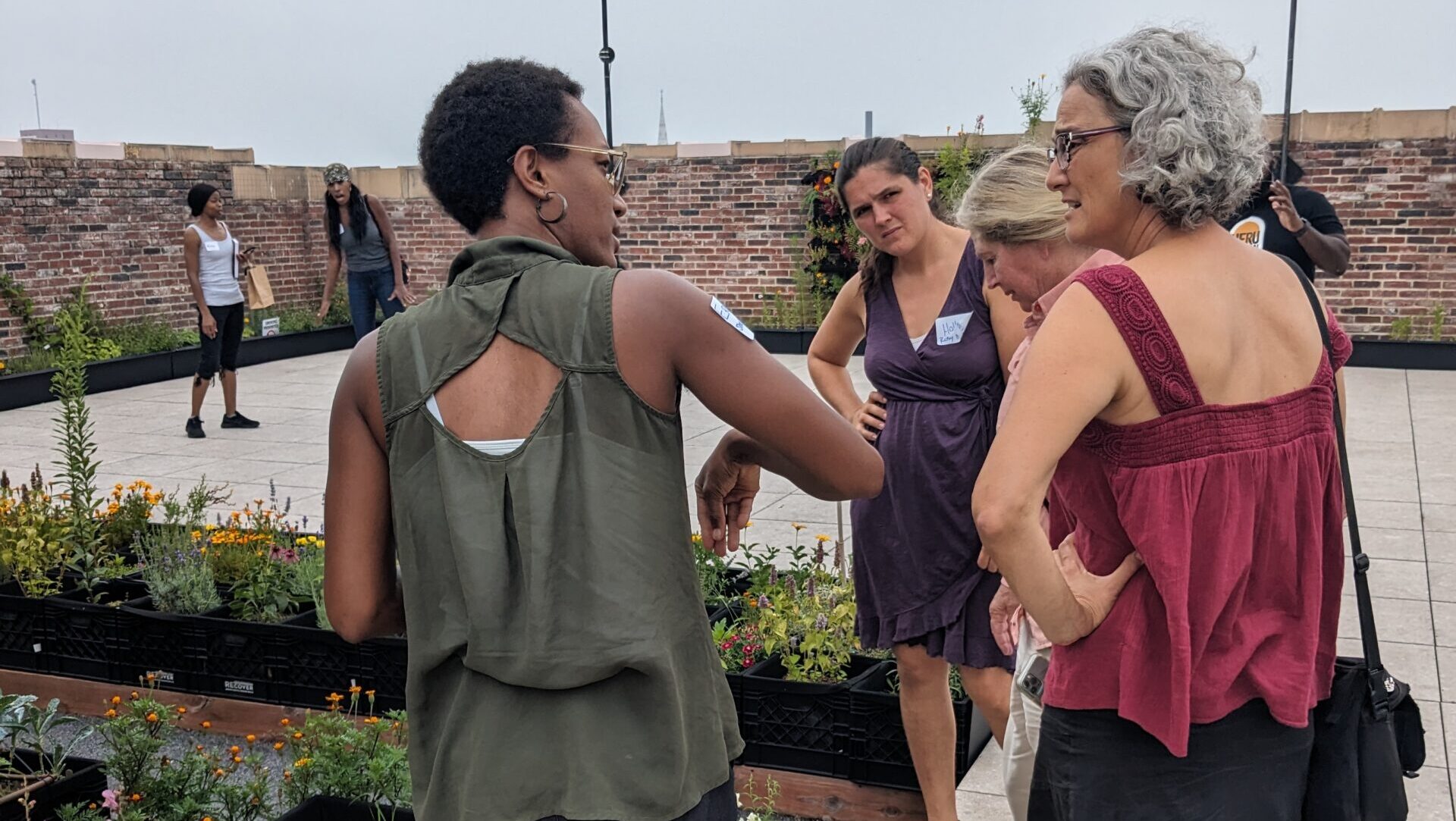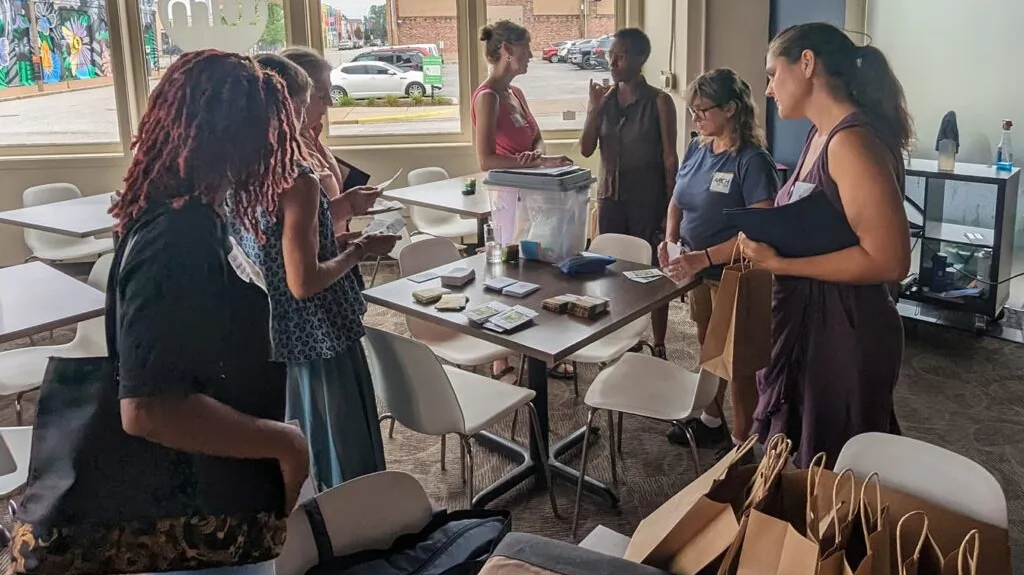by Robin Mosley, Communications and Development Coordinator
Growing vegetables in an urban garden is no easy feat. It takes a lot of work, especially when there’s not a lot of land to work with, but artist and Slow Food Negroni Week Fund grant winner Erin Renee Roberts (on the left in the photo) has been up for the challenge to nurture the beauty of her community in St. Louis and stay close to the land that’s been in her family, too. Erin Renee comes from a long line of family members who are close to the land. Her great-grandmother was a “root worker,” Erin Renee said. “I was told, she would eat worms and she would know which weeds to pick and which would be the proper medicine.”
As a traveling artist, her connection to community and transcending cultural barriers only deepens her relationship to growing. “I love connecting through language and, beyond language, through movement. That’s the form of art that I am most specific with: physical theater styles, and so it has a connection to things that make us connected and community. You have praise dancing, for instance, but you also have deep African spirituality as far as mask work and shamanism go. So I’m called to become a cultivator of the land,” Erin Renee said.

Erin Renee’s link to the land and a grant through Slow Food St. Louis from the Slow Food Negroni Week Fund made it possible for her to become a grower and feel supported along the way. The Negroni Week Fund is just one of the chapter’s programs; it also has biodiversity programs such as project garlic and Known & Grown STL.
The St. Louis chapter’s Negroni Week Fund supports disadvantaged farmers interested in starting a farm on small plots. Slow Food St. Louis uses the USDA’s definition of disadvantaged, which are groups that are subject to racial or ethnic prejudice and can include women depending on the USDA program.
This program, nurtured by Slow Food St. Louis board members Mary Keeter and René Sackett, helped Erin Renee become more connected to farming, especially in connection to entrepreneurship and biodiversity. The inspiration for applying for this grant came about organically. Mary, who also runs Harmony Hills Farm near Leslie, MO, and is a farm outreacher for the Lincoln University Innovative Small Farmers’ Outreach Program, said her growers “deserved the very best.”
Mary is used to having to cobble together makeshift systems for farming, and she didn’t think that was best for all the female winners of this grant. “You are worth it. You deserve this. You deserve to have equipment that works,” Mary said. Between Zoom meetings and support, Erin Renee was able to make some big moves that helped move her creative and economic aspirations forward. “I’m growing with the grant money and growing for the restaurants; I am now considered a farmer. I was able to register my family home as a farm,” Erin Renee said. When Erin Renee is growing for restaurants, it’s not an easy process to begin with; however, Mary explains why it works so well: it’s a process for everyone involved. “Chefs haven’t tried this before. Growers haven’t grown before. Let’s take away the risk for everyone. Give the growers all the resources they need to grow it, and then Slow Food will buy them until [growers are comfortable],” Mary said.


The partnership between Slow Food St. Louis and restaurants has allowed restaurants to get local, thoughtfully grown produce for free, and this in turn makes it easier for growers to participate in relationships with them, all because Slow Food is compensating them. Once they get comfortable, then the St. Louis chapter stops being the go-between for growers and restaurants.
Thanks to partnerships between chefs and farmers that the chapter had developed and nurtured since its inception, over $125,000 in microgrants has been given to farmers from the chapter over the years. These funds were made through rather exclusive, high-end, multi-course, events and dinners, noted René. “The foundation of our chapter was based on enjoying high-end, expensive food, and it’s probably all being served to white-faced, rich people. Let’s just put it out there. And that’s how we made our money,” René said. This year, Slow Food STL’s funding to nurture those connections came from the Slow Food Negroni Week Fund.
Centering grant recipients who grow food is a part of Slow Food St. Louis’ ethos under Mary’s guidance. Using Ark of Taste crops supports St. Louis’ ecosystem, and a driving force is greens from 2023 Plant a Seed kits. “The selected heritage greens support the ecosystem in our region in several ways. Sea kale is a perennial crop and will be planted this spring by participating farmers,” Mary said. “Sea Kale has a deep taproot, which reduces its need for fertilizer and can sustain drought conditions, which are currently being experienced in Missouri. The deep taproot also allows the sea kale to prevent soil erosion and it helps break up compacted soil.”
Their other varieties of greens are annuals, including lettuce, mustard and collard greens; escarole and yu choy sum grow in the spring and fall when traditional vegetables aren’t planted. And when recipients are no longer a part of the program, many are still growing and raising Ark of Taste plants and animals, such as “heritage duck, lamb, beeves and pork breeds,” René said.
This program for Slow Food St. Louis has been a success for its participants, especially Erin Renee. With her connection to her family, land and love of her community, she’s ready to establish her own place that nurtures her interest in growing as her land and history have for her. “I want to be a steward of my own land, and I want to be able to create and cultivate these places for people to come and learn a lot about what I’ve learned, which is through different programs, like a worldwide organization of organic farmers. It’s kind of like an opportunity for cultural immersion. It’s an opportunity to learn about the way that the ecosystem is alike or in different places in the world,” Erin Renee said.
You can pre-order the 2024 Plant a Seed kit, which features seven roots and grains, here!

